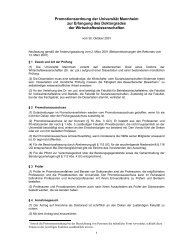The returns to cognitive and non-cognitive abilities in Germany
The returns to cognitive and non-cognitive abilities in Germany
The returns to cognitive and non-cognitive abilities in Germany
You also want an ePaper? Increase the reach of your titles
YUMPU automatically turns print PDFs into web optimized ePapers that Google loves.
ias the coefficients of <strong>in</strong>terest downward. In fact, the results of the additional regressions are<br />
qualitatively similar <strong>to</strong> the ones presented except that coefficients of some personality trait measures<br />
are reduced <strong>and</strong> loose statistical significance.<br />
15 Note that the control variables yield expected f<strong>in</strong>d<strong>in</strong>gs. Full estimation results are therefore not<br />
discussed but are available upon request.<br />
16 Results from the RE models are not given, s<strong>in</strong>ce they are qualitatively similar <strong>to</strong> those from the<br />
HTIV models.<br />
17 Results from the RE models are aga<strong>in</strong> not provided, as they are qualititatively similar <strong>to</strong> the HTIV<br />
results.<br />
18 This is a valuable f<strong>in</strong>d<strong>in</strong>g, s<strong>in</strong>ce it <strong>in</strong>dicates that analyses that are based on either personality<br />
dimensions (He<strong>in</strong>eck, 2007) or <strong>cognitive</strong> <strong>abilities</strong> only (Anger <strong>and</strong> He<strong>in</strong>eck, 2008) do not suffer from<br />
a severe omitted variable bias.<br />
46















